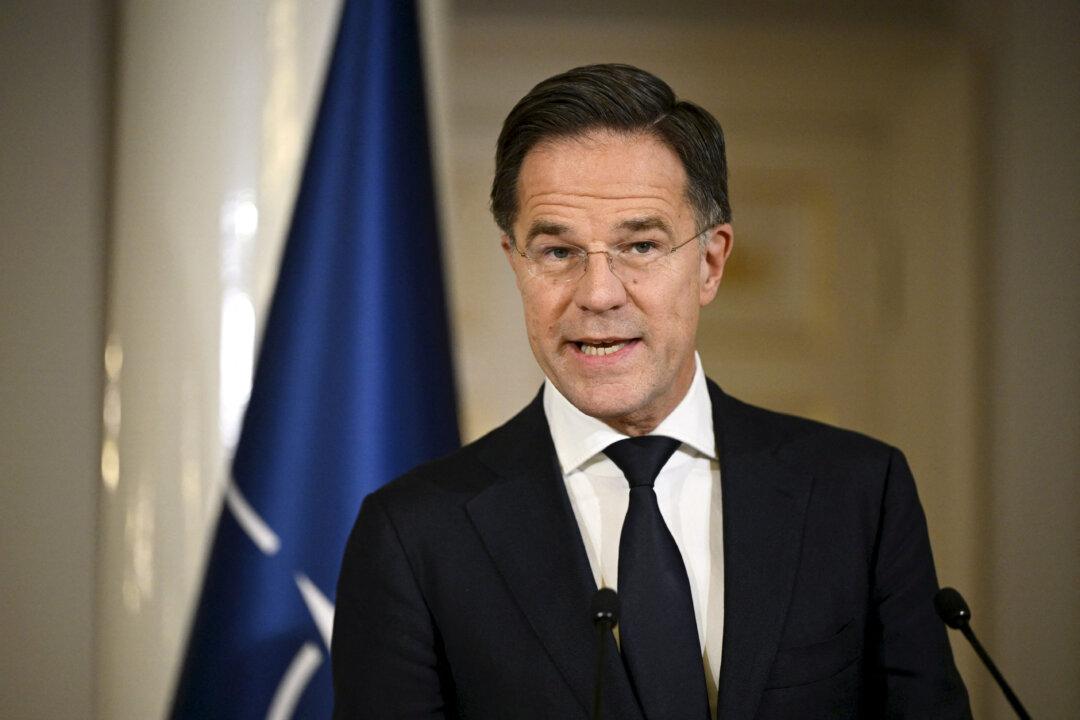The secretary-general of NATO, Mark Rutte, told a meeting at the World Economic Forum in Switzerland on Jan. 23 that a Russian victory in Ukraine would result in the West having to spend “trillions” of dollars to restore the alliance’s credibility.
Rutte, a former Dutch prime minister, said that if Ukraine lost the war with Russia, NATO members would have to increase their defense spending commitments from the current 2 percent of gross domestic product to far more than 3 percent.
“It will not be billions extra, it will be trillions extra,” he told a fringe event at the World Economic Forum in Davos, Switzerland.
“If Ukraine loses, then to restore the deterrence of the rest of NATO, again, it will be a much, much higher price than what we are contemplating at this moment in terms of ramping up our spending and ramping up our industrial production.”
NATO has donated billions of dollars worth of arms and equipment to Ukraine and deployed thousands of troops and equipment in Poland, Romania, and the Baltic countries to deter Moscow from threatening any of the alliance’s members.
Change War ‘Trajectory’
He said: “We have to change the trajectory of the war. ... We cannot allow in the 21st century that one country invades another country and tries to colonize it. We are beyond those days.”Russia invaded Ukraine in February 2022 and has seized large chunks of territory in the south and east.
In recent months, North Korean troops have been deployed in support of Russian forces in the Kursk region, where Ukraine made an incursion into Russia in summer 2024.
Polish Foreign Minister Radek Sikorski welcomed Trump’s comments but said, “This is not the Putin that President Trump knew in his first term.”
“The president of the United States is the leader of the free world. Vladimir Putin is an outcast and an indicted war criminal for stealing Ukrainian children,” he said.
“I would suggest that Putin has to earn the summit, that if he gets it early, it elevates him beyond his significance and gives him the wrong idea about the trajectory of this.”
Rutte told his audience in Davos: “This is not just a European conflict. It is a geopolitical conflict which is being fought out.
“If we got a bad deal, it would only mean that we will see the president of Russia high-fiving with the leaders of North Korea, Iran, and China, and we cannot accept that. That would be geopolitically a big mistake.”
“We thought we had a sustainable peace but basically Putin was able to continue his quest to get more of Ukraine, and he did,” he said.
ESG Affecting Defense Investment
Rutte said at another event at Davos on Jan. 22 that environmental, social, and governance (ESG) guidelines were damaging the West’s ability to invest in defense.“And somehow it’s all the same basket. This is crazy, but this is one of the reasons why I’m trying to reach out to the one billion people living in Nato territory and asking them: go to your banks and your pension funds and tell them that you want to be defended and you want them to spend more.
“That it is crazy that somehow we only have these nice little projects connected to the [U.N.] Millennium Goals.”
The Telegraph reported that François Michel, chief executive of Belgian defense manufacturer John Cockerill, echoed Rutte’s comments and said ESG risked “destroying the European defense industry.”







